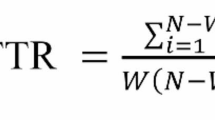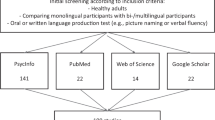Abstract
This study attempted to examine the modulation of emotional effects on L2 lexical attrition. For this purpose, a cross-sectional approach was adopted to analyze emotional effects on L2 lexical attrition with a 500-word vocabulary test taken by 188 Chinese–English bilinguals. As indicated by the results, the modulation of emotional effects on L2 lexical attrition was found to be as active as it was in L2 acquisition; Positive words did not differ from negative words in L2 attrition; All three types of emotional words shared a similar attrition pattern, that is, their attrition went very rapidly within the first 4 years, kept stable between year 5 and year 8, and resumed rapidity after the 9th year, with no significant differences in attrition rate between positive and negative words being detected at any stage. Taken together, this is one of the few studies to investigate L2 lexical attrition among Chinese–English bilinguals, and the first to examine emotional effects on L2 lexical attrition. This study supports the Revised Hierarchical Model in predicating the modulation of emotional effects on L2 lexical attrition.

Similar content being viewed by others
References
Alharthi, T. (2014). The impact of attrition on vocabulary knowledge among Saudi teachers. English Language Teaching, 7, 111–120.
Altarriba, J., & Basnight-Brown, D. (2011). The representation of emotion versus emotion-laden words in English and Spanish in the Affective Simon Task. International Journal of Bilingualism, 15, 310–328.
Anooshian, L., & Hertel, P. (1994). Emotionality in free recall: Language specificity in bilingual memory. Cognition and Emotion, 8, 503–514.
Ayçiçegi-Dinn, A., & Caldwell-Harris, C. (2004). Bilinguals’ recall and recognition of emotion words. Cognition and Emotion, 18, 977–987.
Ayçiçegi-Dinn, A., & Caldwell-Harris, C. (2009). Emotion-memory effects in bilingual speakers: A level-of-processing approach. Bilingualism: Language and Cognition, 12, 291–303.
Bahrick, H. (1984a). Fifty years of second language attrition: implications for programmatic research. Modern Language Journal, 68, 105–118.
Bahrick, H. (1984b). Semantic memory content in permastore: 50 years of memory for Spanish learned in school. Journal of Experimental Psychology: General, 113, 1–31.
Baumeister, J. C., Foroni, F., Conrad, M., Rumiati, R. I., & Winkielman, P. (2017). Embodiment and emotional memory in first versus second language. Frontiers in Psychology, 8, 394.
Brysbaert, M., Warriner, A. B., & Kuperman, V. (2014). Concreteness ratings for 40 thousand generally known English word lemmas. Behavior Research Methods, 46, 904–911.
Cabanac, M. (2002). What is emotion? Behavioral Processes, 60, 69–83.
Caldwell-Harris, C. (2004). Bilingual speakers in the lab: Psychophysiological measures of emotional reactivity. Journal of Multilingual and Multicultural Development, 25, 223–247.
Caldwell-Harris, C., Ayçiçegi, A., & Gleason, J. (2003). Taboo words and reprimands elicit greater autonomic reactivity in a first language than in a second language. Applied Psycholinguistics, 24, 561–571.
Caldwell-Harris, C., & Ayçiçegi-Dinn, A. (2009). Emotion and lying in a non-native language. International Journal of Psychophysiology, 71, 193–204.
Caldwell-Harris, C., Gleason, J., & Ayçiçegi-Dinn, A. (2006). When is a first language more emotional? Psychophysiological evidence from bilingual speakers. In A. Pavlenko (Ed.), Bilingual minds: Emotional experience, expression and representation (pp. 257–311). Clevedon: Multilingual Matters.
Caldwell-Harris, C., Tong, J., Lung, W., & Poo, S. (2011). Physiological reactivity to emotional phrases in Mandarin-English bilinguals. International Journal of Bilingualism, 15, 329–352.
Colbeck, K., & Bowers, J. (2012). Blinded by taboo words in L1 but not L2. Emotion, 12, 217–222.
College English Syllabus Revision Team. (1986). National college english teaching syllabus (for students of arts and sciences majors). Shanghai: Shanghai Foreign Language Education Press.
College English Syllabus Revision Team. (1999). National college english teaching syllabus (for regular college students). Shanghai: Shanghai Foreign Language Education Press & Higher Education Press.
Conrad, M., Recio, G., & Jacobs, A. (2011). The time course of emotion effects in first and second language processing: A cross-cultural ERP study with German-Spanish bilinguals. Frontiers in Psychology: Language Sciences, 2, 1–16.
Degner, J., Doycheva, C., & Wentura, D. (2012). It matters how much you talk: On the automaticity of affective connotations of first and second language words. Bilingualism Language and Cognition, 15, 181–189.
Dodds, P. S., Clark, E. M., Desu, S., Frank, M. R., Reagan, A. J., Williams, J. R., et al. (2014). Human language reveals a universal positivity bias. Proceedings of the National Academy of Sciences of the United States of America, 112, 2389–2394.
Eilola, T., & Havelka, J. (2010). Behavioral and physiological responses to the emotional and taboo Stroop tasks in native and non-native speakers of English. International Journal of Bilingualism, 15, 353–369.
Eilola, T., Havelka, J., & Sharma, D. (2007). Emotional activation in the first and second language. Cognition and Emotion, 21, 1064–1076.
Ferré, P., García, T., Fraga, I., Sánchez-Casas, R., & Molero, M. (2010). Memory for emotional words in bilinguals: Do words have the same emotional intensity in the first and second language? Cognition and Emotion, 24, 760–785.
Ferré, P., Sánchez-Casas, R., & Fraga, I. (2013). Memory for emotional words in the first and the second language: effects of the encoding task. Bilingualism Language and Cognition, 16, 495–507.
Foroni, F. (2015). Do we embody second language? Evidence for ‘partial’ simulation during processing of a second language. Brain Cognition, 99, 8–16.
Freed, B. (1982). Language loss: current thoughts and future directions. In R. Lambert, et al. (Eds.), The loss of language skills (pp. 1–5). Mass: Newbury House.
Gardner, R., Lalonde, R., Moorcroft, R., & Evers, F. (1987). Second language attrition: The role of motivation and use. Journal of Language and Social Psychology, 6, 29–47.
Hansen, L. (2001). Language attrition: the fate of the start. Annual Review of Applied Linguistics, 21, 60–73.
Hansen, L. (2011). The acquisition, attrition, and relearning of mission vocabulary. In M. S. Schmid & W. Lowie (Eds.), Modeling bilingualism: From structure to Chaos (pp. 115–134). Amsterdam/Philadelphia: John Benjamins.
Hansen, L., Chong, W., Colver, A., Pereira, H., Robinson, J., Sawada, A., et al. (2012). The lost word: Vocabulary attrition in six mission languages. In L. Hansen (Ed.), Second language acquisition Abroad: The LDS missionary experience (pp. 111–134). Amsterdam: John Beniamins.
Hsu, C. T., Jacobs, A. M., & Conrad, M. (2015). Can Harry Potter still put a spell on us in a second language? An fMRI study on reading emotion-laden literature in late bilinguals. Cortex, 63, 282–295.
Iliev, R., Hoover, J., Dehghani, M., & Axelrod, R. (2016). Linguistic positivity in historical texts reflects dynamic environmental and psychological factors. Proceedings of the National Academy of Sciences of the United States of America, 113, e7871–e7879.
Ivaz, L., Costa, A., & Duńabeitia, J. A. (2016). The emotional impact of being myself: emotions and foreign-language processing. Journal of Experimental Psychology:Learning, Memory, and Cognition, 42, 489–496.
Jin, X., & Ni, C. (2011). Linguistic features of attrited English vocabulary learned in Chinese context. Foreign Language Research, 161, 45–51.
Kazanas, S. A., & Altarriba, J. (2016). Emotion word processing: effects of word type and valence in Spanish-English bilinguals. Journal of Psycholinguistic Research, 45, 395–406.
Kroll, F., & Stewart, E. (1994). Category interference in translation and picture naming: evidence for asymmetric connections between bilingual memory representations. Journal of Memory and Language, 33, 149–174.
Kuhberg, H. (1992). Longitudinal L2-attrition versus L2-acquisition, in three Turkish children: empirical findings. Second Language Research, 8, 138–154.
Mclaughlin, A. (2015). Mood-dependent memory in English/Spanish bilinguals. Butler Journal of Undergraduate Research., 1, 6.
Meara, P. (2004). Modeling vocabulary loss. Applied Linguistics, 25, 137–155.
Medford, N., Phillips, M. L., Brierley, B., Brammer, M., Bullmore, E. T., & David, A. (2005). Emotional memory: Separating content and context. Psychiatry Research Neuroimaging, 138, 247–258.
Ni, C. (2006). Analysis of the factors affecting foreign/second language attrition. Foreign Language and Research, 38, 50–55.
Ni, C. (2007). Essential attributes of foreign language attrition. Journal of Foreign Languages, 16, 42–52.
Ni, C. (2009). Empirical study on the factors affecting foreign language attrition. Foreign Language and Research, 41, 179–185.
Ni, C. (2010a). Path and strength analysis of factors affecting foreign language attrition. Foreign Languages and Their Teaching, 26, 26–29.
Ni, C. (2010b). Data-mining the effects of affective factors on attritors’ target language exposure with structural equation model and classification. Foreign Language Learning Theory and Practice, 31, 26–32.
Ni, C. (2013). A study of the dynamic process of foreign lexical attrition. Foreign Language and Research, 45, 909–921.
Opitz, B., & Degner, J. (2012). Emotionality in a second language: It is a matter of time. Neuropsychologia, 50, 1961–1967.
Pavlenko, A. (2012). Affective processing in bilingual speakers: Disembodied cognition? International Journal of Psychology, 47, 405–428.
Ponari, M., Vinson, D., Fox, N., Costa, A., & Vigliocco, G. (2015). Processing advantage for emotional words in bilingual speakers. Emotion, 15, 644–652.
Puntoni, S., De Langhe, B., & Van Osselaer, S. (2009). Bilingualism and the emotional intensity of advertising language. Journal of Consumer Research, 35, 1012–1025.
Qu, N. (2007). Modeling Vocabulary Loss: Approach leading to a comprehensive analysis of vocabulary attrition? Language and Culture Research, 1, 214–219.
Robinson, C. J., & Altarriba, J. (2014). The interrelationship between emotion, cognition, and bilingualism. Yearbook of the Poznan Linguistic Meeting, 1, 103–117.
Russell, R. (1999). Lexical maintenance and attrition in Japanese as a second language. In L. Hansen (Ed.), Second language attrition in Japanese contexts (pp. 114–141). Oxford: Oxford University Press.
Schepens, J., Dijkstra, T., Grootjen, F., & van Heuven, W. (2013). Cross-language distributions of high frequency and phonetically similar cognates. PLoS ONE, 8, e63006.
Segalowitz, N., Trofimovich, P., Gatbonton, E., & Sokolovskaya, A. (2008). Feeling affect in a second language: The role of word recognition automaticity. Mental Lexicon, 3, 47–71.
Sianipar, A., Middelburg, R., & Dijkstra, T. (2015). When feelings arise with meanings: how emotion and meaning of a native language affect second language processing in adult learners. PLoS ONE, 10, e0144576.
Sutton, T., Altarriba, J., Gianico, J., & Basnight-Brown, D. (2007). The automatic access of emotion: Emotional Stroop effects in Spanish-English bilingual speakers. Cognition and Emotion, 21, 1077–1090.
Tomiyama, M. (1994). Longitudinal second language attrition: Case studies of Japanese returnees. Baltimore: Paper Presented an Annual TESOL Convention.
Tomiyama, M. (1999). The first stage of second language attrition: A case study of a Japanese returnee. In L. Hansen (Ed.), Second language attrition in Japanese contexts (pp. 59–79). Oxford: Oxford University Press.
Tomiyama, M. (2000). Child second language attrition: a longitudinal case study. Applied Linguistics, 21, 304–332.
Warriner, A. B., Kuperman, V., & Brysbaert, M. (2013). Norms of valence, arousal, and dominance for 13,915 English lemmas. Behavior Research Methods, 45, 1191–1207.
Weltens, B. (1987). The attrition of foreign-language skills: a literature review. Applied Linguistics, 8, 22–37.
Weltens, B. (1989). The attrition of French as a foreign language. Dordrecht/Providence: Foris.
Weltens, B., & Marjon, G. (1993). Attrition of vocabulary knowledge. In R. Schreuder & B. Weltens (Eds.), The Bilingual Lexicon (pp. 135–156). Amsterdam: Benjamins.
Weltens, B., & van Els, T. (1986). The attrition of French as a foreign language: Interim results. In B. Weltens, K. de Bot, & T. van Els (Eds.), Language attrition in progress (pp. 205–221). Dordrecht: Foris Publication.
Wu, Y., & Thierry, G. (2012). How reading in a second language protects your heart. Journal of Neuroscience, 32, 6485–6489.
Yoshitomi, A. (1999). On the loss of English as second language by Japanese returnee children. In L. Hansen (Ed.), Second language attrition in Japanese contexts (pp. 80–111). Oxford: Oxford University Press.
Author information
Authors and Affiliations
Corresponding author
Additional information
Publisher's Note
Springer Nature remains neutral with regard to jurisdictional claims in published maps and institutional affiliations.
Rights and permissions
About this article
Cite this article
Ni, C., Jin, X. Will Emotional Effects Modulate L2 Lexical Attrition as they Do in L2 Acquisition?. J Psycholinguist Res 49, 583–605 (2020). https://doi.org/10.1007/s10936-020-09702-x
Published:
Issue Date:
DOI: https://doi.org/10.1007/s10936-020-09702-x




